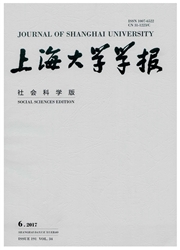

 中文摘要:
中文摘要:
"一边倒"的外交政策和国内一系列思想改造运动,使苏式美学话语拥有了全国性的话语生产机制,成为"美学在中国"的主导性内容,导致苏式马克思主义美学研究在中国获得话语霸权。"十七年"时期的美学研究,一定意义上是苏式美学话语体系及其研究范式挤压遮蔽西方美学话语体系及其研究范式的过程,因研究视野狭隘和方法陈旧,原本丰富的美学研究被窄化为哲学认识论基础上的反映论美学,简单化为"主观-客观""唯物-唯心"的贴标签过程,终因学理性缺失造成"中国的美学"研究的偏狭。
 英文摘要:
英文摘要:
The "one-sided" foreign policy and a host of ideological transformations offered nationwide dis- course generating mechanisms for the Soviet aesthetic discourse which became the dominant content of "aesthet- ics in China", leading to the discourse hegemony of Soviet Marxist Aesthetic Studies in China. The aesthetic research during the "Seventeen-Year" period (from the founding of new China to the eve of the Cultural Revo- lution) was to some extent a process of the Soviet aesthetic discourse system and its research paradigm squee- zing and overshadowing the Western aesthetic discourse system and its research paradigm. Due to the narrow re- search perspective and outdated research methods, the originally diverse aesthetic studies were narrowed down to the "reflective aesthetics" based on philosophical ontology, simplified into the "subjective-objective" and "materialism-idealism" labeling process, and finally reduced to the bigotry of "Chinese Aesthetics" incurred by the lack of rationale.
 同期刊论文项目
同期刊论文项目
 同项目期刊论文
同项目期刊论文
 期刊信息
期刊信息
